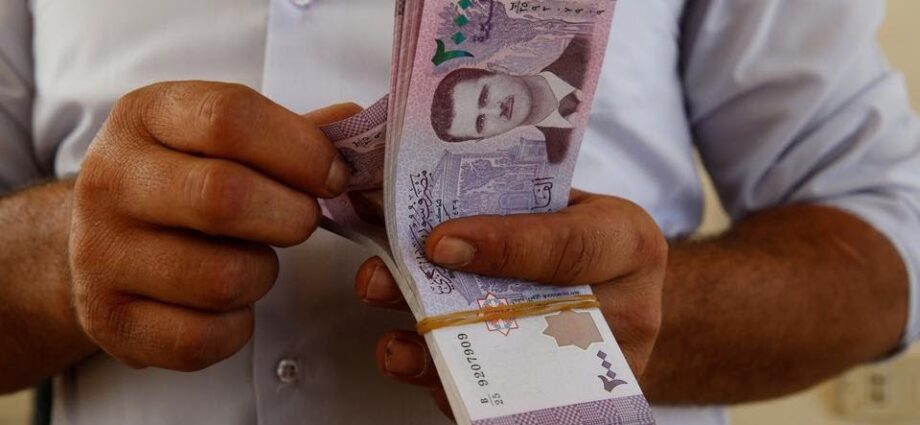The United States imposed harsh sanctions on Syria, following the implementation of the Caesar Act by US Congress on June 17, 2020. The sanctions have broad bipartisan support in the US Congress and are not likely to be lifted anytime soon. How are these sanctions affecting Syria?
The impacts have swept across Syria, resulting in hardships for everyday Syrians and threats to the global community, in addition to the intended impacts on the wealthy insiders of the Assad government. Here are a few impacts of the Caesar Act sanctions.
1) The Syrian pound has collapsed, resulting in acute hardship for people in North and East Syria.
Prices in the Syrian marketplace have spiked. Everyday Syrians are having trouble affording medicines, bread, and other household goods. In 2019, the average rate of the Syrian pound was approximately 500 pounds per US dollar. At the end of July 2020, the rate was hovering at about 2,000 pounds per US dollar. Most analysts attribute the collapse of the currency to global market divestment from the Syrian pound in preparation for the Caesar Act sanctions.
A loaf of bread now costs about 500 Syrian pounds. A bag of ice to preserve food is about 2,000 pounds. The average low-wage worker in Syria currently makes roughly 2,500 to 3,500 pounds per day. The AANES has offered to buy wheat from farmers in US dollars so that it can then provide food aid to the people of the region, but this program is still in its initial stages.
When traders on the global market decide all at once that a currency may be less valuable in the future, they will stop buying that currency and sell off their reserve currency, resulting in a much lower value of that currency. That’s what happened through May and June of 2020, when it became clear to currency traders that the Caesar Act was inevitable. Those currency traders know that when the rest of the world stops doing business with a country, that country’s currency won’t be useful. That’s why economic analysts say that the Syrian pound’s collapse can be directly linked to the Caesar Act.
2) Economic needs are jeopardizing efforts to combat Coronavirus.
Syria currently shows the early warning signs of a COVID outbreak. The autonomous region of North and East Syria has recorded its first cases, and the virus is likely ripping through the population undetected. A stay-home order has been issued to help quell the outbreak, as the healthcare system in North and East Syria has been badly damaged after a decade of war and instability. However, due to the economic collapse, many Syrians feel they must keep working, and cannot stay home, through the pandemic in order to pay the rising costs of food and medicines.
In addition, the AANES has felt compelled to keep certain border crossings open to commercial activity, despite the risk of COVID. Most of the trade into North and East Syria comes from the Kurdish Regional Government area of Iraq or from the Damascus-controlled part of Syria. Both the KRG area and Damascus are currently experiencing high COVID infection rates. The economic imperatives are jeopardizing public health, and may create an incubator for the global pandemic.
3) ISIS may make a comeback in Syria amidst the economic downturn.
A recent report by the US Department of Defense Inspector General said that, “ISIS could make gains if underlying conditions, such as ineffective government and sectarian tensions, are not addressed.”
The forces who have been fighting ISIS, the Syrian Democratic Forces, are now having more difficulty feeding and paying soldiers, buying military equipment, supporting tactical teams, and performing other functions due to the economic downturn. The SDF must also maintain the detention facilities that hold thousands of captured ISIS militants, but must now do so with even fewer resources. One prison break may provide the former ISIS “caliphate” with the capacity it needs to re-group and carry out a new wave of attacks.
The Caesar Act has generated the kind of economic downturn that terrorist recruiters thrive in. Not to mention a new excuse to once again blame the United States and the West for hardships in the Muslim world. It may be only a matter of time before the violence of ISIS terrorism once again blasts through the Western world.
4) Assad Government Insiders are Finding New Ways to Cheat the Sanctions
The former Assad government insider, Rami Makhlouf, revealed recently on social media that he had set up offshore shell companies for his company, Cham Holdings, to avoid US sanctions. He wrote, “These companies’ role and aim is to circumvent (Western) sanctions on Cham Holding.” Makhlouf’s confession was made in a rant against the Syrian government’s investigation of his holdings. If Makhlouf has set up offshore shell companies to circumvent the sanctions, other Syrian government insiders have no doubt done the same.
The aim of the Caesar Act sanctions was to squeeze the Assad government and the business elites who are close to Assad. But if these insiders are simply side-stepping the sanctions, while everyday Syrians suffer more, the sanctions have the opposite of the intended effect.

